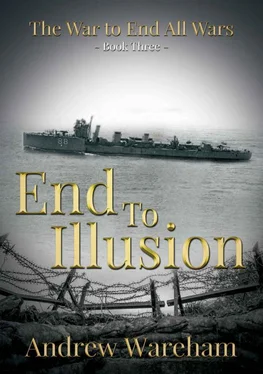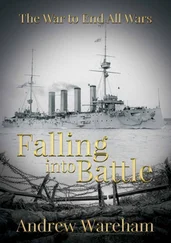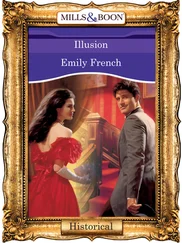“Very good. As long as you are English, little else matters, does it?”
“No, sir.”
“How long have you been in, Tolstoy?”
“Four weeks, sir, since my birthday. I joined as soon as it was legal, sir.”
“Well done. Enjoying the life?”
“Mostly, sir. I liked being a Cadet at school, sir, and wanted to be a soldier even before the war. I was to apply to Sandhurst, sir.”
“Even better! You sound like the sort we want.”
“I hope so, sir.”
They reached the gate and a full guard drawn up to welcome the new colonel. Richard stepped out of the car and was greeted by an elderly captain.
“Hawkeswill, sir. Adjutant.”
“Thank you, Mr Hawkeswill. Shall we have a look at the guard?”
“Sir! Our new Sergeant Major O’Grady, sir.”
“We have met, Captain Hawkeswill. Good to see you here, ‘Major. When did you arrive?”
“I was posted three days since, sir.”
“Good. Let’s see the guard.”
“Sergeant Keane, sir, B Company.”
The sergeant snapped to a salute – very smart, as was to be expected of an old soldier, well into his thirties. He was wearing the Military Medal.
“Boer War, Sergeant Keane?”
“Boxers, sir. Battalion was in Hong Kong, sir. Marched from the Taku Forts to Peking, sir.”
“Good. In this war?”
“Wounded in the Ypres Salient, sir. Sent back in October. Fit for service since April, sir.”
“Picked up the MM at Ypres, I presume?”
“Yes, sir.”
“Good. Have you considered going for a commission, Sergeant Keane?”
“Not thought of it, sir.”
“Then do so. There is a need for good men with experience to become officers. I will encourage any man who thinks himself capable to put his name forward.”
Richard had no idea whether Keane would be suitable; the word would be passed through the whole battalion within hours and, hopefully, a number of men would apply. He would wait until they had been a month in the trenches and then start to select the best of them; there would vacancies by then.
He glanced at the rank of eight men, all new recruits by their uniforms, just three of them showing tanned and wind-browned by outdoor work as farmhands or builder’s labourers or the like. The office workers and factory hands would be less resilient in the trenches, as a rule. They presented arms, correctly.
“Smart turn-out, Sergeant Keane.”
“Thank you, sir.”
The Adjutant took over and walked Richard the fifty yards to the Mess, pointing out the little that was to be seen on the camp.
“Parade ground, sir, next to the drill square, which is not ideal – difficult to use both at once for orders on one being picked up on the other.”
“Is there any other space for a drill square?”
“No, sir. The sole other flat area is the cricket square, which obviously cannot be used for the purpose.”
“Why not?”
“Well…”
It was so obvious that Hawkeswill could not think of the words to reply. It was unheard of even to consider sacrificing the cricket ground.
“I will examine the site, Captain Hawkeswill.”
It was very wrong, started the new man off on a bad footing, the Adjutant feared.
“One hour to lunch time, sir. I have arranged for all officers to be present thirty minutes in advance of the hour so that you can greet them, sir.”
“Sensible. Where is Major Templeton? I had understood him to be my second in the battalion?”
“He will be waiting in the Mess, sir, to welcome you before you join the officers.”
It was unusual but not actually wrong of him.
“Are we up to strength in the Mess?”
“Almost fully, sir. Ten companies, each with a captain and a lieutenant and a second lieutenant. All as it should be, sir. There is a Quartermaster as well, sir.”
“A doctor?”
“To be appointed, sir. We have no Vet, sir.”
“Vet? Why should we have such an officer?”
“For the chargers, sir. The officer must have his pair of mounts, though we have allowed the second lieutenants to delay their purchases temporarily. I fear several of the young men will have to go, sir, if they continue to show unable to make furnish themselves correctly. A pity, they are mostly good officers in the making, but one must have standards, sir! Captain Burstall and Lieutenant Semple have strings of polo ponies as well, being rather keen on sport, which is very good for the battalion, sir. Are you having your horses walked across, sir?”
“There is no place for the horse in the trenches, Captain Hawkeswill! All horses will be gone within the week. Officers must be able to march alongside their men and will accompany them on their route marches with immediate effect. That to go up on the noticeboard today.”
“But, how are we to get on without them, sir? There are parades, you know…”
“All officers have feet – two of them, I trust! They will use them. As for polo – we have no time to play games!”
“I don’t think the Major will like that, sir.”
They entered the Mess, greeted by the Mess-Sergeant who was dressed as a maitre d’hotel, all black and white rather than in uniform.
“Are you a soldier?”
“Yes, sir. Sergeant…”
Richard interrupted him before he could finish introducing himself.
“Then get into uniform! Now! Never let me see you on duty dressed like a bloody waiter again!”
“Yes, sir.”
“Move then!”
The unfortunate sergeant ran.
He had undoubtedly been obeying orders, Richard thought. Tough luck! An old sergeant should have known better than to present himself to his new colonel looking like a greasy Italian pimp in fancy dress!
Major Templeton was waiting in the anteroom, glass in hand, his jovial greeting dying on his lips.
“Early in the day for the bar to be open, Major.”
“Normal practice, sir. After a hard morning we can all do with a drop of something to raise our spirits, sir!”
“I will not tell you how to run your Mess, Major. I will say that if I discover any officer to be worse for alcohol in the working day then I shall send him to court martial, without a second chance. Any officer, Major.”
Templeton was close to fifty, overweight and with the rosy nose and cheeks and bloodshot eyes of the hardened drinker. He scowled, tossed back his gin and put his glass down without calling for a refill.
“What is your opinion of the officers, Major? We go to France in a month or so, I much trust. Are there any who should not go with us?”
“In my opinion, sir, the bulk of these new wartime officers are not at all the thing and should be sent away to these strange new creations of Kitchener’s. ‘Chums’ and ‘Pals’ and all of that damned nonsense! I have had no fewer than four inform me that they cannot pay their Mess fees, let alone buy their horses! No income of their own and expecting to live on their pay , of all things. I have told them that I shall be recommending their dismissal from the battalion!”
“Not for that cause, Major. Reduce Mess fees to a reasonable wartime level. Not more than one half of any officer’s pay. With instant effect. We are not a bloody dining club, sir, nor are we a riding stables! We are to be a fighting battalion of foot! I have already instructed that all officers’ horses are to be sent away.”
“Do what?”
“Horses, Major Templeton, are valueless in the trenches. There is no place for them. None of our officers will take horses to France. All of our officers will march beside their men – that includes you and me, sir! There will be no horses here by the end of the week. That includes polo ponies. Any officer who cannot exist without access to a horse may inform me of the fact. He will then be sent to court martial for insubordination. As for Mess Fees – stuff and bloody nonsense, man! Inform me of any debts accruing to the younger men so far and I shall clear them myself. From today onwards it will be possible for every man to live on his pay, as it should be. You may not have noticed, Major, but we are fighting a war!”
Читать дальше












